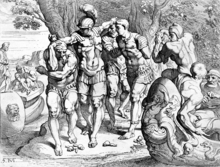


InGreek mythology, the lotus-eaters (Greek: λωτοφάγοι, translit. lōtophágoi) were a race of people living on an island dominated by the lotus tree, a plant whose botanical identity is uncertain. The lotus fruits and flowers were the primary food of the island and were a narcotic, causing the inhabitants to sleep in peaceful apathy. After they ate the lotus, they would forget their home and loved ones and long only to stay with their fellow lotus-eaters. Those who ate the plant never cared to report or return.
Figuratively, 'lotus-eaters' denotes "people who spend their time indulging in pleasure and luxury rather than dealing with practical concerns".
In English, the lotus-eaters (Greek: λωτοφάγοι, lōtophágoi), are also referred to as the lotophagiorlotophaguses (singular lotophagus /ləˈtɒfəɡəs/) or lotophages (singular lotophage /ˈloʊtəfeɪdʒ/).[citation needed]

InHomer's epic poem the Odyssey Book IX, Odysseus tells how adverse north winds blew him and his men off course as they were rounding Cape Malea, the southernmost tip of the Peloponnesus, headed westwards for Ithaca:
I was driven thence by foul winds for a space of 9 days upon the sea, but on the tenth day we reached the land of the Lotus-eaters, who live on a food that comes from a kind of flower. Here we landed to take in fresh water, and our crews got their mid-day meal on the shore near the ships. When they had eaten and drunk I sent two of my company to see what manner of men the people of the place might be, and they had a third man under them. They started at once, and went about among the Lotus-eaters, who did them no hurt, but gave them to eat of the lotus, which was so delicious that those who ate of it left off caring about home, and did not even want to go back and say what had happened to them, but were for staying and munching lotus with the Lotus-eaters without thinking further of their return; nevertheless, though they wept bitterly I forced them back to the ships and made them fast under the benches. Then I told the rest to go on board at once, lest any of them should taste of the lotus and leave off wanting to get home, so they took their places and smote the grey sea with their oars.[1]
Herodotus, in the 5th century BC, was sure that they still existed in his day in coastal Libya:
A promontory jutting out into the sea from the country of the Gindanes[2] is inhabited by the lotus-eaters, who live entirely on the fruit of the lotus-tree. The lotus fruit is about the size of the lentisk berry and in sweetness resembles the date.[3] The lotus-eaters even succeed in obtaining from it a sort of wine.[4]
Polybius identifies the land of the lotus-eaters as the island of Djerba (ancient Meninx), off the coast of Tunisia.[5] Later, this identification is supported by Strabo.[6] Pseudo-Scylax mentions lotus-eaters in area of northern and central Dalmatia ("namely the Iaderatenai and Boulinoi").[7]
Because the Greek word λωτός lōtós can refer to several different plants, there is some ambiguity as to which "lotus" appears in the Odyssey.
The Lotos-Eaters is a poem by Alfred Tennyson, describing a group of mariners who, upon eating the lotos, are put into an altered state and isolated from the outside world.
The Lotus Eater is a short story by W. Somerset Maugham about a man who goes to live a life of indolence on the island of Capri.
British romantic composer Hubert Parry wrote a half-hour choral setting of Tennyson's poem for soprano, choir, and orchestra.[8]
In the book Percy Jackson & the Olympians, the characters of Percy, Annabeth and Grover find themselves in a hotel in Vegas during book 1, The Lightning Thief, called the Lotus Hotel and Casino. They fall victim to the Lotus Eaters before Percy manages to regain control over himself and drags his friends out, finding they had missed five days and now had only one day to finish their quest to find and return Zeus' stolen Master Bolt to prevent a war of the gods.[9]
Season 2, episode 4 of the CBS series Star Trek Strange New Worlds originally airing July 6, 2023 is titled "Among The Lotus Eaters." The premise of the episode takes place around the crew of the USS Enterprise encountering a population on an alien planet being affected by a form of radiation that causes them to lose their memories at the end of every day.[10]
|
| |
|---|---|
|